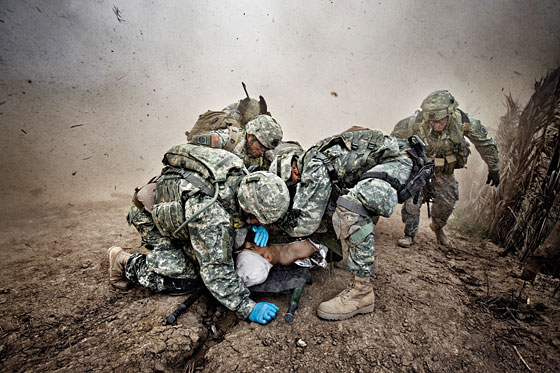
The effort to tie 9/11 to Saddam Hussein began as early as six hours after the first plane strike, with an aide to Donald Rumsfeld noting his boss’s orders as: “Best info fast, judge whether good enough hit S.H. [Saddam Hussein] at same time. Not only U.B.L. [Osama bin Laden].” From that point until the invasion of Iraq began, on March 19, 2003, the Bush administration would pursue several theories—all ultimately debunked—as it sought to build its case for war.
1) The Prague Connection
Birth of Theory: September 18, 2001: A U.S. official tells the AP of a report suggesting Mohamed Atta met earlier that year with an Iraqi intelligence agent in Europe. Sources add that the meeting took place in a restaurant outside Prague on April 8, 2001. Three days after the initial press report, CIA director George Tenet tells President Bush that the story “just doesn’t add up.”
Apex: December 9, 2001: Dick Cheney claims on Meet the Press that it’s “been pretty well confirmed that [Mohamed Atta] did go to Prague and he did meet with a senior official of the Iraqi intelligence service … several months before the attack.”
Death of Theory: October 21, 2002: The New York Times reports that Czech President Václav Havel told senior U.S. officials that they should “discount” previous Czech-intelligence reports on the Atta meeting.
2) The Switched I.D.
Birth of Theory: September 13, 2001: Former CIA director James Woolsey champions a theory that Iraqi intelligence helped Ramzi Yousef carry out the 1993 Trade Center bombing. The claim rests on proving that Yousef and his alias Abdul Basit are in fact two different people. The Iraqi government, the theory goes, helped Yousef steal Basit’s identity so he could obtain a fraudulent passport and flee the U.S. after the attack. If the theory is corroborated, Woolsey thinks, it would point to Saddam Hussein’s involvement in 9/11 as well.
Apex: Late September: Woolsey travels to Britain to investigate. There, he obtains copies of Basit’s fingerprints. Deputy Defense Secretary Paul Wolfowitz signs off on the trip.
Death of Theory: April 21, 2004: Newsweek cites a Justice Department official who reveals that the Basit fingerprints were a match for Yousef’s—the two were the same person. And in fact, Abdul Basit is likely Yousef’s real name.
3) The Salman Pak Training Camp
Birth of Theory: November 6, 2001: The New York Times and PBS interview an Iraqi identifying himself as former lieutenant general Jamal al-Ghurairy at a hotel in Beirut. He asserts that Saddam’s intelligence service runs a terrorist training camp at Salman Pak, near Baghdad. Among the skills taught: hijacking an airplane without using weapons.
Apex: November 12, 2002: President Bush delivers a speech to the U.N., using as background a report that includes the Salman Pak story.
Death of Theory: April 6, 2003: U.S. forces overrun the Salman Pak facility and find no evidence that it was used as a terrorist training camp. Three years later, Jamal al-Ghurairy is exposed as an impostor.
4) The Chemical-Weapons Link
Birth of Theory: December 19, 2001: Libyan Al Qaeda operative Ibn al-Shaykh al-Libi is captured by Pakistani forces and soon transferred to U.S. custody, then rendered to Egypt. After weeks of “enhanced interrogations,” al-Libi states that Al Qaeda members received biological- and chemical-weapons training from the Iraqi government. Less than a month later, a Defense Intelligence Agency report questions the veracity of al-Libi’s claims.
Apex: February 5, 2003: Colin Powell, citing al-Libi, tells the U.N., “I can trace the story of a senior terrorist operative telling how Iraq provided training in these [biological and chemical] weapons to Al Qaeda.”
Death of Theory: February 2004: In CIA custody, al-Libi recants his story of Iraqi–Al Qaeda collaboration.
From the archives
• Obama Announces End to Iraq Combat Mission (Daily Intel/NYMag, August 31, 2010)
• The Source of the Trouble (New York Magazine, June 7, 2004)